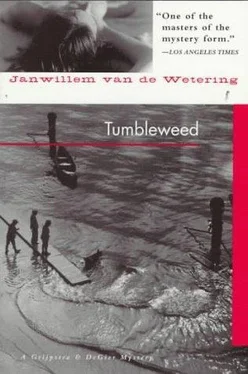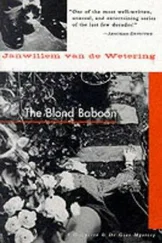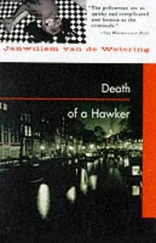Janwillem De Wetering - Tumbleweed
Здесь есть возможность читать онлайн «Janwillem De Wetering - Tumbleweed» весь текст электронной книги совершенно бесплатно (целиком полную версию без сокращений). В некоторых случаях можно слушать аудио, скачать через торрент в формате fb2 и присутствует краткое содержание. Жанр: Полицейский детектив, на английском языке. Описание произведения, (предисловие) а так же отзывы посетителей доступны на портале библиотеки ЛибКат.
- Название:Tumbleweed
- Автор:
- Жанр:
- Год:неизвестен
- ISBN:нет данных
- Рейтинг книги:4 / 5. Голосов: 1
-
Избранное:Добавить в избранное
- Отзывы:
-
Ваша оценка:
- 80
- 1
- 2
- 3
- 4
- 5
Tumbleweed: краткое содержание, описание и аннотация
Предлагаем к чтению аннотацию, описание, краткое содержание или предисловие (зависит от того, что написал сам автор книги «Tumbleweed»). Если вы не нашли необходимую информацию о книге — напишите в комментариях, мы постараемся отыскать её.
Tumbleweed — читать онлайн бесплатно полную книгу (весь текст) целиком
Ниже представлен текст книги, разбитый по страницам. Система сохранения места последней прочитанной страницы, позволяет с удобством читать онлайн бесплатно книгу «Tumbleweed», без необходимости каждый раз заново искать на чём Вы остановились. Поставьте закладку, и сможете в любой момент перейти на страницу, на которой закончили чтение.
Интервал:
Закладка:
"Ha," de Gier said. "A helicopter picked him up, on the beach. It dropped him on another beach where a fast car was waiting for him. He raced it to Amsterdam, let himself into the houseboat with a key, and swish and plop."
"Yes," Grijpstra said.
"Balls."
"Yes. There are nine hundred people to the square mile in Holland. The helicopter couldn't have picked him up without them seeing it. True, true. So he didn't do it."
"A pity," de Gier said, "because he is dangerous all right. The diplomat doesn't scare me and if the colonel was after me I would offer to buy him a drink but if IJsbrand Drachtsma…"
"You are serious?"
"I am," de Gier said. "He escaped to England in 1943 when the Germans were watching every inch of the beaches."
"And the engine of his rowboat broke down."
"Just imagine what it must have been like," de Gier said. "Twenty or thirty hours to go and the beaches looking at you with a thousand eyes. Nasty German eyes peeping out from under their heavy helmets, and machine guns and cannon everywhere and fighter planes in the sky and you sit there in your nutshell tinkering with an outboard engine and the others are rowing and dropping their oars and cursing.
"Would be fun," Grijpstra said.
"I always wanted to do it, but I was a little boy then. Where were you?"
"I spent the last year on a farm, working and trying to repair an old motorcycle. Took me all winter and then the war was over and it wouldn't go."
"Doesn't he scare you?" de Gier asked.
"No. I have nothing to lose. Besides, he irritates me. Cocksure, that's what he is. He has spent a lifetime winning."
"You haven't lost, have you?"
"No," Grijpstra said, "or perhaps I have. There isn't much difference. But he doesn't know. You remember the way he smiled to us when the commissaris introduced us as his assistants?"
"He smiled down."
"Of course he did. It looked friendly but it wasn't."
"He didn't kill her, because he wasn't there. He must have sent someone."
"But why would he have wanted her dead?"
"Blackmail," de Gier said. "What else? He is married and she was threatening to break up his marriage. Perhaps he has all his property in his wife's name. The house in Schiermonnikoog, the house in Amsterdam, his yacht, his airplane, the houseboat, his shares."
"We should meet his wife."
"There's something else," de Gier said, "something I haven't told you about."
"You should tell me everything," Grijpstra said.
"Yes, but perhaps this is silly."
"Go on, go on," Grijpstra said.
"O.K.," de Gier said "you know little Cardozo?"
"Isn't he one of the new detectives?"
"Yes, that young fellow, short, wears a brown imitation fur coat, looks like a musician."
"What about him?"
"I asked him to wait in the corridor when we were grilling Drachtsma, trying to grill him I should say for he was winning that time. I wanted to know how Drachtsma would behave after we had done with him. Cardozo hung about outside and when Drachtsma came out Cardozo was walking behind him, pretending he was going somewhere. They went to the main entrance downstairs together. The door is always locked and the constable who watches the door has a button which he has to press to release the lock. Drachtsma showed his slip, the constable pressed his button, and the door opened. It's a door you have to push."
"Yes, yes," Grijpstra said, "I know the door. I go through it a hundred times a day."
"Quite. But Drachtsma didn't push the door, he kicked it, with his great smelly boot, and as he went through it he farted. A nasty noisy smelly fart."
"And Cardozo got it right in the face?"
"He did."
"You shouldn't trust these young detectives, they tell you what you want to hear."
"No," said de Gier. "Cardozo is ail right. He told me what he saw, and what he smelted in this case."
"Yes," Grijpstra said, "and Drachtsma's home is on Schiermonnikoog. Right?"
Grijpstra got up, forgetting Oliver who had to wake up suddenly and who dug his claws into Grijpstra's legs. Grijpstra yelled and Oliver hung on. Grijpstra backed into the bookcase and de Gier tried to help. A vase fell and broke on the floor splashing water on Oliver who had dropped to the ground. Oliver yelled and bit de Gier on the leg. It took a little while before the room became quiet again.
"He is a challenge," Grijpstra said, "keeps you on your toes. Every policeman should have a cat like that; I will suggest it to the chief constable. We'll be the most aware police force on earth."
"Yes. I am glad you appreciate him now. So we go to the island. When?"
"Tomorrow," Grijpstra said. "First boat tomorrow and we'll play it easy. It is a nice island; I have been there before, I even know the local chief of police. He is an adjutant and he likes birds. Let's be tourists and see what we can see. The commissaris is on an island too."
De Gier was putting his jacket on and looking at himself in the mirror. He was mumbling to himself.
"We still have the afternoon," Grijpstra said. "Go to the gymnasium and practice some judo. You have been getting lazy lately. You aren't as good as you used to be. I saw Geurts throw you twice in two minutes the other night. Geurts, of all people!"
"The instructor had asked me to let Geurts get some exercise," de Gier said.
"Sure."
"You don't believe me?"
"Sure."
"Listen here," de Gier said. "Half the fun of judo is to let somebody else throw you. You learn to fall that way. It's very important to be able to fall."
"Sure," Grijpstra said.
"All right," de Gier said, "and what are you going to do this afternoon?"
"I am going to fire thirty rounds at the range and then I'll clean my pistol. And I'll ask the sergeant if I can fire the carbine a few times and then I'll find someone who knows about knife throwing. I'll throw a knife until I hit something with it and then I'll go home."
"I hope it will take you all night," de Gier said, and dialed a number. "The boat leaves at ten A.M. tomorrow," he said, putting the phone down. "I'll pick you up at seven."
"No," Grijpstra said. "We can't take the car. There are no cars allowed on the ferry and we may have to spend a few days on the island. We'll take the train. I'll meet you at the station at six-thirty."
10
The KLM plane began its descent toward Plesman Airport, , and the commissaris woke up. His small wizened face looked almost eager and he acknowledged his own excitement with good-natured understanding. He hadn't traveled much in his life although he had wanted to, and apart from the south coast of France, where he had spent a number of holidays with his family, first in cheap hotels and later in a rented cottage, he only knew the world through books which he collected, buying them second-hand from the book stalls in the Old Man's Gate in the inner city. He had looked through the few books which mentioned , immediately after he had come home to tell his wife that he was leaving the next morning, and while his wife fussed and packed his suitcase and found his passport and his medicines, he turned the pages of a thin volume written by a poet who had lived on the island. He read the lines aloud, repeating some of the words. "Cunucu," the commissaris said.
"Yes, dear?" his wife asked.
"Cunucu, that's the outback, the outback of ."
"Outback?" his wife asked.
"Fields," the commissaris said, "with nothing on it. Just cactuses, I imagine, and a few goats maybe. There used to be forests and Indians."
"Ah," his wife said, folding up a shirt. "Do you want a lot of ties?"
"Not too many. I wonder who chopped the forests down. I hope the Spanish did. They had it before us, you know."
"Indians?" his wife asked.
"There aren't any left."
Читать дальшеИнтервал:
Закладка:
Похожие книги на «Tumbleweed»
Представляем Вашему вниманию похожие книги на «Tumbleweed» списком для выбора. Мы отобрали схожую по названию и смыслу литературу в надежде предоставить читателям больше вариантов отыскать новые, интересные, ещё непрочитанные произведения.
Обсуждение, отзывы о книге «Tumbleweed» и просто собственные мнения читателей. Оставьте ваши комментарии, напишите, что Вы думаете о произведении, его смысле или главных героях. Укажите что конкретно понравилось, а что нет, и почему Вы так считаете.












